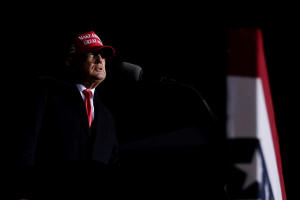Could a Trump grand juror's comments affect possible Georgia charges?
 Send a link to a friend
Send a link to a friend
 [February 24, 2023]
By Jack Queen [February 24, 2023]
By Jack Queen
(Reuters) - Media interviews given by the foreperson of the Georgia
grand jury that investigated former President Donald Trump's attempt to
overturn his 2020 election loss in the state present a public relations
problem for prosecutors but need not stop them from bringing charges if
warranted, according to legal experts.
The foreperson, Emily Kohrs, was interviewed by a variety of U.S. news
outlets this week and offered a rare window into the secretive process
in which members of the grand jury weigh evidence and make
recommendations to prosecutors on possible criminal charges.
Kohrs, 30, offered hints as to what the grand jury recommended in its
report, most of which remains sealed, after it wrapped up its work in
January. Kohrs told CNN that "the big name that everyone keeps asking me
about - I don't think you will be shocked."
That appeared to be a reference to Trump, though Kohrs did make that
clear. She did not respond to requests for further comment.
Legal experts said the various remarks made by Kohrs likely would not be
enough to undo any charges.

"In my 26 years of prosecution experience, I have never seen a grand
jury indictment quashed because of grand jury misconduct," said Georgia
lawyer David Cooke, the former district attorney in Georgia's Macon
County who also served as a prosecutor in the Fulton County district
attorney's office that is now handling the election inquiry.
Trump, who lost in Georgia and nationally to Democrat Joe Biden and has
made false claims of widespread voting fraud, lashed out at the news,
saying without offering evidence that the interviews showed that the
grand jury process was unfair. In a social media post, Trump described
the case as "ridiculous" and "strictly political."
Trump, who in November launched a bid for the 2024 Republican
presidential nomination, took a similarly combative tone toward the
various investigations including two impeachment trials that he faced
during his four years in office and since.
Trump's lawyers did not immediately respond to requests for comment on
Thursday.
The Georgia investigation could lead to the first-ever criminal charges
against a former U.S. president. As such, prosecutors may proceed with
an abundance of caution, particularly if Kohrs divulges more sensitive
details.
"If that (further revelations from Kohrs) occurs, then the question will
be, do they have to start the grand jury process from scratch? Because
the result might be tainted by her talking about the deliberative
process," said Michael Weinstein, a former U.S. Justice Department
prosecutor who now specializes in white collar criminal defense.
[to top of second column]
|

Former U.S. President Donald Trump holds
a rally in Commerce, Georgia, U.S. March 26, 2022. REUTERS/Alyssa
Pointer

'BAD OPTICS'
The interviews by Kohrs could create public relations headaches for
prosecutors already navigating a politically polarizing
investigation.
"It's bad optics," said legal expert Clark Neily of the Cato
Institute, a libertarian think tank in Washington. "It makes the
process look unfair to targets of the grand jury, even though it
doesn't provide grounds for quashing an indictment."
The special grand jury heard testimony behind closed doors including
from Trump allies such as Republican U.S. Senator Lindsay Graham of
South Carolina, former White House Chief of Staff Mark Meadows and
attorney Rudy Giuliani. Excerpts of its findings released on Feb. 16
showed that the panel concluded that some witnesses may have lied
under oath.
But the grand jury lacked indictment powers. Fani Willis, the Fulton
County district attorney steering the investigation, must decide
whether to bring the panel's charging recommendations to a regular
grand jury. That extra step would further insulate prosecutors from
any accusations of grand juror misconduct based on the Kohrs
interviews, legal experts said.
"There still has to be an independent assessment by the district
attorney and a subsequent grand jury who hands up the indictment,"
Weinstein said.
A spokesperson for Willis' office did not immediately respond to a
request for comment.
It is rare for judges to dismiss indictments based on breaches of
grand jury protocols, which require proof that panelists were
prejudiced or engaged in egregious misconduct that would make a fair
trial impossible, experts said.
Cooke, whose time in the Fulton County DA's office overlapped with
Willis's service as a prosecutor before she became district
attorney, expressed confidence in the fairness of the process.

"Any grand jury in Fulton County is going to have a huge diversity
of viewpoints, politics and backgrounds," Cooke said. "You're going
to have a group of well-minded citizens trying to do the right
thing."
(Reporting by Jack Queen in New York; Editing by Will Dunham and
Scott Malone)
[© 2023 Thomson Reuters. All rights
reserved.]This material may not be published,
broadcast, rewritten or redistributed.
Thompson Reuters is solely responsible for this content. |